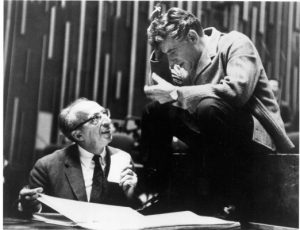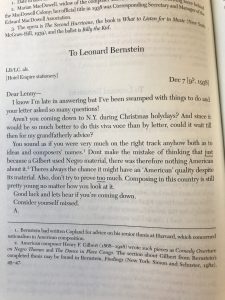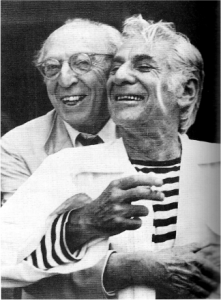It is no secret that Leonard Bernstein and Aaron Copland were great friends. Even though I had heard this going into my research, I had no idea to what extent the level of mutual investment and encouragement was! I was astounded and quite honestly touched to find the amount of loving correspondence that I did between the two composers. While there are extensive works devoted to both of their respective correspondences, I was particularly interested in a letter written by Copland to Bernstein that addresses their different viewpoints on American music.
In this letter, written December 7, 1938, Copland writes Bernstein with advice on Bernstein’s senior thesis at Harvard, which explores nationalism in American composition. His thesis, completed in 1939, is entitled “The Absorption of Race Elements into American Music,” in which he proposes a new American nationalism — one that is defined by the way in which the composer blends their own heritage with “Negro” and “New England” musical traditions, as these form the “sociological backbone of the country.”1
In all of the correspondence I’ve read between the two, Copland shows his affection for Bernstein while also giving “grandfatherly advice,” as he calls it in this particular letter. His advice regarding Bernstein’s thesis in the letter at hand is as follows:
Don’t make the mistake of thinking that just because a Gilbert used Negro material, there was therefore nothing American about it. There’s always a chance it might have an ‘American’ quality despite its material.
This comment made me curious — what was Bernstein’s assertion about Gilbert, and who was this Gilbert anyway?
It turns out Henry F. Gilbert (1868-1928) was a composition student of Mcdowell’s, and was particularly interested in African-American music. Bernstein cites Gilbert’s Comedy Overture on Negro Themes and The Dance in the Place Congo in his thesis to make claims about American music. He asserts that these pieces contribute to the nationalistic process beginning in 1900, a process inspired by Dvorak’s New World Symphony, by engaging in artificial representation where “new indigenous materials were merely imposed upon an otherwise neutral kind of musical scheme.” Bernstein writes that despite Gilbert being a “sensitive and sound musician,” the way in which he incorporates ‘Negro’ material in his works is not American. 1
Here is a recording of Gilbert’s Comedy Overture on Negro Themes:
He complicates the definition of American music further when he categorizes the slow and lyrical sections of the Comedy Overture on Negro Themes as European. He even writes that “There is no consequential development emerging inevitably from the thematic ideas themselves; there is no basic American “feeling.””1
So he is in fact defining American music by its sound, which leaves me rather confused. Copland rather encourages him to look beyond the material, demonstrating that Copland has a much broader view of American music. He remarks that:
Composing in this country is still pretty young no matter how you look at it.
Copland has open arms when it comes to American compositions — an attitude which Bernstein does not share at this point in his life.
Note: The two were 18 years apart but died just 2 months apart — Bernstein at 72 and Copland at 90.
Sources
- Bernstein, Findings. New York: Simon and Schuster, 1982.
- Copland, Aaron. Aaron Copland to Leonard Bernstein, December 7, 1938. In The Selected Correspondence of Aaron Copland, edited by Elizabeth B Crist and Wayne Shirley. New Haven & London: Yale University Press, 2006.




Great job with this! There are a few interesting primary sources here: Bernstein’s thesis and Copland’s letter. I wonder whether Copland’s embrace of “Americanness” beyond particular sounds represents the added maturity that 18 years difference can make. I suspect that Bernstein moved in that direction, too, as he got older and wrote such ambitious pieces as Chichester Psalms and MASS. One thing to add to this: the page numbers where you found the quotes from Bernstein’s thesis and from the letter you cited. Thanks for sharing all of your fascinating research discoveries!